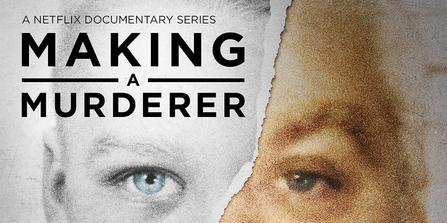My homie Scout, hit me up the other day and told me to check out the Netflix documentary series, Making a Murderer.
The documentary has been making splashes, so odds are you know somebody that’s seen it or chattering about it, but if you haven’t, I recommend going into it blind, and doing further reading after the fact. However I gotta write about something here, so if you haven’t seen it, go watch it and then come back. Or…keep reading, I can’t really stop you.
SPOILER WARNING!

Making a Murderer is the story of Steven Avery, a man who was imprisoned for the sexual assault and attempted murder, and who was later exonerated, only to be subsequently accused and convicted of the murder. This alone would be a worthwhile discussion for a documentary, but as the filmmakers go into details, one realizes there are/were many holes in the investigation. The documentary tends to be less an examination of the innocence or guilt of Avery and more an exploration of the process that led to his conviction and sentencing.
The documentary relies heavily on lawyer interviews and courtroom footage illustrating holes in a law-enforcement story. The documentary has been considered compelling, in fact, some have started petitions to pardon Steven Avery.
I have a few problems with the docuseries. It felt uneven and was seemingly trying to nudge you to incline he was innocent (there is enough doubt either way to the point I’m not inclined one way or the other on his innocence). As a result, the documentary seemed to somewhat missed the mark at times instead focusing on allegations of corruption, and focusing on the lawyers burden to battle this and the pain on the family. All of this makes for a compelling watch, and doesn’t ruin the documentary, but just misses what I think was the more important discussion. What was illustrated was inconsistent practices by law enforcement and the judicial system seemingly, in order to ensure a conviction. The way it was gone about and illustrated seemed to be almost conspiratorial.
The story goes beyond just Avery, his lawyers, and his family. Sadly, Brendan Dassey, Avery’s nephew is labelled as an accomplice. Brendan, a boy who confesses to the police after hours, without a parent or lawyer present. Dassey, is a boy who seems to be on the lower end of the IQ range, which sadly is brought up again and again throughout the documentary by a variety of people (which is heartbreaking but that’s another issue).
I think the documentary is enjoyable (as much as one can be with this issue), it draws you in and makes you think. I don’t think the issue at hand is Avery and Dassey’s innocence (although I do think reopening the case is something that should be done), but the real problem is an examination of the abuse of legal systems. I am a person naturally wary of the law and judicial court system, but if they exist we do need to hold them to higher standards and presume that such abuse should be examined carefully. Making a Murderer makes a compelling illustration about what happens when things go awry.
Thanks for the suggestion Scout. You’re a real pal.












